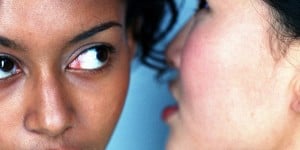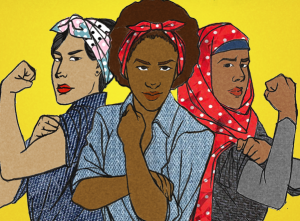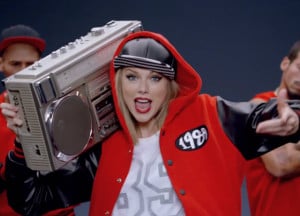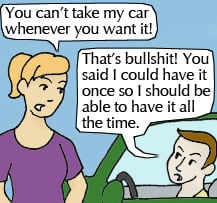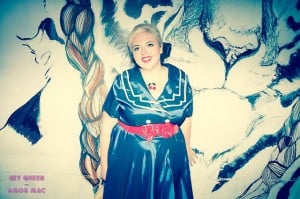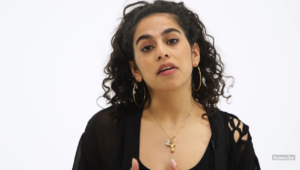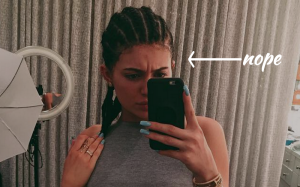Panel 1
(The cartoonist, Alli, a woman with brown hair and glasses, holding a cake.)
Alli: Hi, I’m Alli, your cartoonist, and food hates me. I have Celiac Disease as well as non-Celiac food allergies, and today we’re going to go over some things that people with food allergies are tired of hearing.
Panel 2
(Alli holding a stack of highly allergic foods – peanuts, fish, milk, and wheat.)
Alli: Food allergies are fairly rare, but Food Allergy Sufferers (FASs) have to deal with their effects every day. Some allergies are less severe than others, but keep in mind that allergies can literally kill people, so FASs are dealing with high stakes. Let’s get started!
Panel 3
(A woman holding a piece of cake on a plate, offering it to a man who is backing away from her while the woman speaks.)
Woman: C’mon, you can have just a little bit, right?
Panel 4
(Alli holding up a tiny speck of food and speaking.)
Alli: Nope! Some allergies are so severe that FASs can’t even be in the same room as their allergen, but even asking someone with mild allergies to “have a little” is asking them to risk injury, illness, and possibly death.
Panel 5
(A man holding a drink can out to a woman who is refusing it. The man is speaking and looks frustrated.)
Man: You could have some if you wanted to – you’re just being picky.
Panel 6
(Alli holding a cupcake and looking sadly at it.)
Alli: FASs would probably love it if they could have some of whatever you’re offering – they’re not being picky, they’re trying not to get sick. However, this is important: If you are picky, do not lie and say that you have food allergies – it makes the world more dangerous for people who do have allergies.
Panel 7
(A woman holding a tray of brownies and frowning at a man who has refused to take a brownie. The woman is speaking.)
Woman: Ugh, you can’t eat anything – are you anorexic or something?
Panel 8
(Alli looking very angry and holding a sign that says “Do not do this, this is awful.”)
Alli: FASs have a really difficult relationship with food – we need it to live, but we don’t want to die over a sandwich. Some FASs do develop eating disorders (EDs) as a result of hyper vigilance, but accusing a FAS of having an ED because they won’t eat their allergen is incredibly insensitive to FASs and people with EDs.
Panel 9
(A woman holding a bag of chips to another woman, who looks uncertain. The woman holding the bag is speaking.)
Woman: I’m pretty sure it’s okay. You can have some!
Panel 10
(Alli shrugging and holding an apple.)
Alli: “Pretty sure” isn’t good enough. No one wants to play Russian roulette with an appetizer. Thank you for offering, but don’t get offended if FASs don’t take you up on “pretty sure.”
Panel 11
(One man shrugging and looking perplexed and speaking to a second man who has his hands clasped and looks sad.(
Man: That’s a lot to be allergic to – what if it’s all in your head?
Panel 12
(Alli holding an EpiPen and looking skeptical.)
Alli: Hell no. It’s not up to me, or any FASs, to prove my allergies to you, and it’s rude to suggest that we would lie about something that’s so fundamental to our health.
Panel 13
(A man holding a salad and frowning while speaking to a woman holding an empty plate.)
Man: You just want special treatment!
Panel 14
(Alli shrugging and looking sad.)
Alli: The only special treatment FASs want is for food not to kill them. We know we’re hard to feed and wish we could make it easier, but for the most part all we want is to be safe.
Panel 15
(Alli, wearing a chef’s hat and holding a mixing bowl and a whisk.)
Alli: If you want to make a safe space for FASs, talk to your FAS friends about their specific allergies and ask how you can help. A good way to start is to ask your friends for recipes they can eat and practice cooking with them – and always be mindful of cross-contamination: allergic foods shouldn’t touch or be prepared with the same equipment as non-allergic foods.
Panel 16
(Alli smiling with one hand on her hip, gesturing to the reader with the other hand.)
Alli: What it really comes down to is that food allergies are serious and can be harmful, but it only takes a little bit of care to be more inclusive – believe FASs when they speak, keep ingredient lists handy, and always ask if you’re not sure a food is safe.






